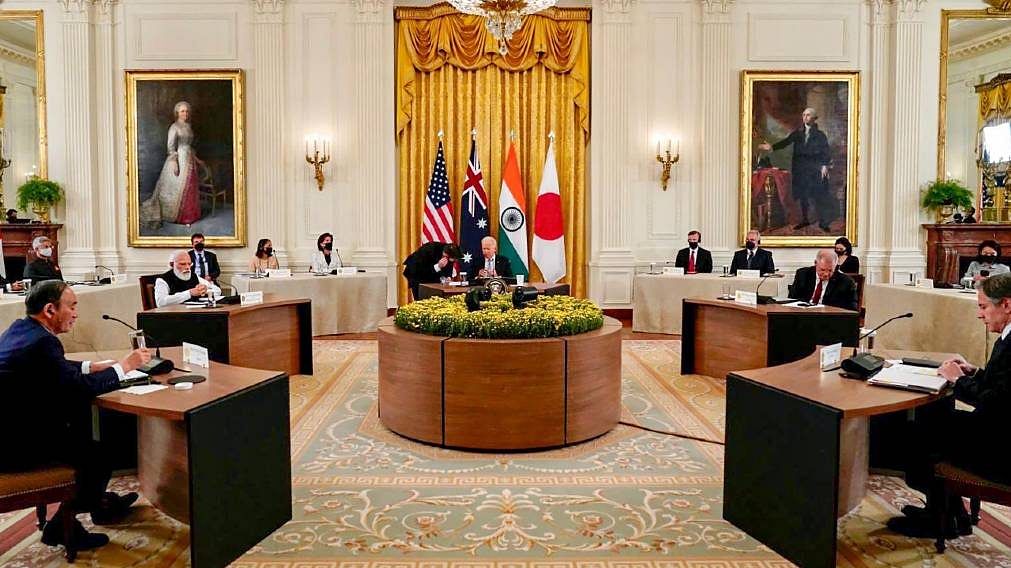New Delhi: The Quad countries’ leaders — Prime Minister Narendra Modi, US President Joe Biden, Australian PM Scott Morrison and Japanese PM Yoshihide Suga — Friday pressed for peace and prosperity of the Indo-Pacific region, in a veiled dig at China.
During the first in-person summit at the White House, the Quad countries also came down heavily on Pakistan over its role as an “instigator” in Afghanistan.
Without explicitly mentioning China by name, the Quad leaders said the group is “a force for regional peace, stability, security, and prosperity”.
The leaders also made an indirect reference to the China-Taiwan tug of war and the tensions between China and Japan over the Senkaku Islands, saying the Quad would “affirm support” to “small island states” in the Pacific, East and South China Seas while adhering to the UN Convention on the Law of the Sea (UNCLOS).
“Towards that end, we will continue to champion adherence to international law, particularly as reflected in the UN Convention on the Law of the Sea, to meet challenges to the maritime rules-based order, including in the East and South China Seas,” the joint statement said.
“We will continue our assistance with Pacific Island countries on responses to the health and economic impacts of Covid-19 and on quality, sustainable infrastructure, as well as partner to mitigate and adapt to the impacts of climate change, which poses especially serious challenges for the Pacific,” the statement added.
Addressing the media after the summit, Foreign Secretary Harsh V. Shringla said the “real focus” of the Quad is to see how “we can work with other like-minded countries in the Indo-Pacific region. So, democracy is an important factor that binds us together, but it’s also an important factor that enables us to work with other democratic countries and work within democratic frameworks.”
Also read: Modi puts India-US trade in focus at first bilateral meeting with President Joe Biden
Changing dynamics in South Asia and Indo-Pacific
The first Quad Summit was held virtually in March this year, where such strong messages were not given out explicitly. However, much has changed since then in terms of geopolitical dynamics in South Asia and in the larger Indo-Pacific domain.
From a Taliban regime taking over Afghanistan to the birth of a trilateral military alliance between Australia, the US and the UK (AUKUS) to counter China, questions were being raised on the significance and relevance of the Quad platform.
Commenting on this significant shift of the Quad being more vocal on China, Aparna Pande, Director (Initiative on the Future of India and South Asia) at the Hudson Institute told ThePrint that Beijing’s “aggressive tactics in various spheres, against each of these four countries, has led to and helped sustain the Quad”.
“The Quad is one of many multilateral arrangements within the Indo-Pacific that the US hopes will together push back against China’s aggressive tactics. AUKUS is another such arrangement which comprises two members of the Quad and the UK,” she added.
Michael Kugelman, deputy director and senior associate for South Asia, The Wilson Center, said this time the Quad Summit marked “the most robust sign yet that four key like-minded players are prepared to act in concrete ways to counterbalance Beijing”.
“China may not have been mentioned by name in the public messaging about the summit, but it was certainly the target,” he added.
Also read: Quad tent just got bigger with AUKUS. China’s aggressive behaviour will be under watch
‘Afghanistan shouldn’t be used for threat or attack’
This was the first meeting of the Quad leaders since the Taliban took control of Afghanistan’s capital Kabul on 15 August and announced a new interim government that has a clear Pakistan stamp.
While vowing to follow the UNSC Resolution 2593 — adopted under India’s August presidency of the council — which states that the Taliban should live up to its commitments to the international community, the Quad leaders said, “Afghan territory should not be used to threaten or attack any country or to shelter or train terrorists, or to plan or to finance terrorist acts, and reiterate the importance of combating terrorism in Afghanistan.”
In an indirect reference to Pakistan, the Quad countries also said they “denounce the use of terrorist proxies and emphasise the importance of denying any logistical, financial or military support to terrorist groups which could be used to launch or plan terror attacks, including cross-border attacks”.
“We stand together in support of Afghan nationals, and call on the Taliban to provide safe passage to any person wishing to leave Afghanistan, and to ensure that the human rights of all Afghans, including women, children, and minorities are respected,” the grouping stated.
According to Shringla, Pakistan’s role on terrorism needed to be highlighted within the Quad framework.
“An important factor, which sometimes gets overlooked, when you see Pakistan projecting itself as a facilitator whereas, it has really been in many senses an instigator of some of the problems that we’re dealing with, in our neighborhood and beyond,” he said.
Infrastructure, vaccine partnership under Quad
In a major pushback to China’s vaccine diplomacy and Belt and Road Initiative (BRI), the Quad leaders also asserted their own plans for distribution of Covid vaccines around the Indo-Pacific region, and also announced an infrastructure partnership.
The Quad vowed to distribute one billion vaccines to countries in this region.
During the summit, the leaders also announced a new Quad infrastructure partnership under which they have decided to map the region’s infrastructure needs.
“They agreed to focus on infrastructure projects to push back against China’s BRI. And they’re ramping up efforts to develop technologies to serve as an alternative to China’s,” Kugelman said.
He added, “This Quad is not an alliance, but it does represent an increasingly confident and united effort to tackle a shared threat.”
(Edited by Neha Mahajan)
Also read: US, India need to ‘protect democracies’ — Kamala Harris says at 1st meeting with Modi
